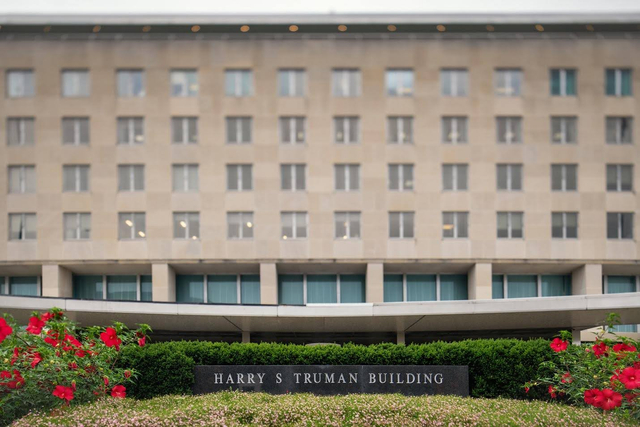
The US State Department’s latest Country Reports on Human Rights Practices delivers a sobering global review, with Russia standing out as a key focus of concern.
The comprehensive report, reviewed by Kyiv Post, meticulously documents an array of alleged war crimes, crimes against humanity, and systematic internal repression orchestrated by Moscow, fundamentally challenging international norms and inflicting widespread suffering.
JOIN US ON TELEGRAM
Follow our coverage of the war on the @Kyivpost_official.
The findings underscore a grim reality: Russia’s ongoing invasion of Ukraine, now in its third year, has become a conduit for unprecedented abuses.
Beyond the battlefield, the Kremlin has intensified its crackdown on dissent at home, employing restrictive legislation to silence critics and control information.
Russia’s war: a catalog of alleged atrocities
The report provides compelling evidence that Russian forces and officials have engaged in widespread human rights violations in Ukraine. Accounts detail “execution-style killings of Ukrainian men, women, and children,” alongside severe torture in detention facilities.
These torturous acts reportedly include brutal beatings, electrocution, mock executions, and pervasive sexual violence. Similar abuses were noted against Ukrainian prisoners of war (POWs), with Amnesty International reporting a significant increase in alleged executions of Ukrainian POWs by Russian forces in 2024.
A particularly egregious revelation is the systematic, forced deportation of Ukrainian civilians, especially children, to Russia. Thousands of children have allegedly been separated from their families through coercive “filtration” processes before being sent to re-education and adoption facilities in Russia and Russian-occupied Crimea.
Other Topics of Interest
EU to Send €1.6 Billion from Frozen Russian Assets to Ukraine
The EU will direct $1.6 billion in interest earnings from frozen Russian assets to help Ukraine repay loans under the G7 Extraordinary Revenue Acceleration (ERA) initiative.
The International Criminal Court (ICC) has issued arrest warrants for Russian President Vladimir Putin and his Children’s Rights Commissioner Maria Lvova-Belova, directly linking them to these alleged unlawful transfers. Efforts by Ukrainian authorities and relatives to recover these children face substantial obstacles, including perilous journeys and harassment.
Indiscriminate attacks by Russian forces against civilian infrastructure are heavily scrutinized. The report highlights “massive waves of attacks” targeting energy, water and heating facilities, causing widespread blackouts and disrupting essential services for millions.
Hospitals and schools have also been repeatedly struck. The World Health Organization has recorded nearly 2,000 attacks on healthcare infrastructure since February 2022. A July 2024 missile attack on Kyiv’s Okhmatdyt Children’s Hospital, killing two and injuring 16, including seven children, stands as a stark example.
Overall, the UN Office of the High Commissioner for Human Rights (OHCHR) recorded over 12,000 Ukrainian civilian casualties between February 2022 and November 2024, with 96% resulting from explosive weapons in populated areas.
Beyond Ukraine, the report also cites credible allegations of human rights abuses by Kremlin-backed mercenary groups, such as the Wagner Group, operating in countries like Syria and the Central African Republic.
These abuses include beatings, rape and forced labor. The European Court of Human Rights recently upheld these findings, ruling that Russia violated international law in Ukraine and held it responsible for the 2014 downing of Malaysia Airlines Flight 17 (MH17).
The Kremlin’s iron grip: crushing dissent at home
Domestically, Russia’s human rights situation continues its alarming decline. The government has enacted a barrage of new, restrictive laws to suppress dissent, leading to a systematic crackdown on independent expression. Anti-war protesters and political opposition figures face mass incarceration, exemplified by the death of prominent anti-corruption campaigner, Alexei Navalny, in a remote prison.
The Kremlin has intensified efforts to control information, prosecuting individuals for online expression and forcing the closure of virtually all independent media outlets and non-governmental organizations (NGOs).
Journalists operate under constant threat, facing arrest, physical attacks and harassment, particularly for reporting on government malfeasance or the war in Ukraine. The report details cases of journalists charged with “distributing false information” or “participation in an extremist association” simply for their work.
The expansive “foreign agent” law has become a potent weapon, financially and professionally isolating independent voices. Amnesty International was declared an “undesirable organization” in May 2025, effectively criminalizing its activities within Russia.
Internet censorship is pervasive, with thousands of websites blocked. New legislation passed in July 2025 threatens fines for merely searching for “extremist” online content or promoting VPN services.
The report also highlights a troubling increase in convictions for treason and espionage. Social issues are not spared; the “international LGBT public movement” has been outlawed as “extremist,” leading to administrative and criminal prosecutions for displaying rainbow symbols. Even political opposition groups like the Civic Initiative party, which attempted to nominate an anti-war candidate, have been dissolved, further constricting Russia’s already narrow political space.
Ukraine’s internal challenges during the war
The report also addresses human rights concerns within Ukrainian government-controlled territory, acknowledging that some issues arise from necessary wartime martial law. While Ukrainian authorities are cleared of extrajudicial killings, credible allegations of torture and cruel treatment by law enforcement are noted, particularly against Russian POWs during initial internment.
The conflict has also impacted media freedom in Ukraine. The government’s “telemarathon” system, consolidating wartime news coverage, has raised concerns from the European Commission regarding media monopolization and a lack of pluralism. Journalists critical of the administration have reportedly faced intimidation, including threats of military conscription, and alleged surveillance by security services.
Under scrutiny: the report’s own controversies
The annual Country Reports are vital for US foreign policy, informing decisions on aid and security. The State Department maintains its commitment to objectivity. However, this year’s edition is not without its own controversy.
Human rights advocates, including Human Rights First, have voiced alarm over the administration’s “streamlining” of the reports.
These changes, allegedly driven by a focus solely on statutorily mandated topics, may lead to a reduction in coverage of issues such as government corruption, LGBTQ+ rights, women’s rights, and the rights of persons with disabilities – areas traditionally included but not explicitly required by law.
Critics argue that such modifications could undermine the report’s traditional breadth, diminish its reliability for advocacy groups and international bodies, and ultimately, weaken the US’s consistent global stance on universal human rights.
As the war in Ukraine persists and Russia’s internal repression deepens, this latest State Department report serves as a stark, albeit contested, reminder of the profound human cost of conflict and authoritarianism in the modern era.





